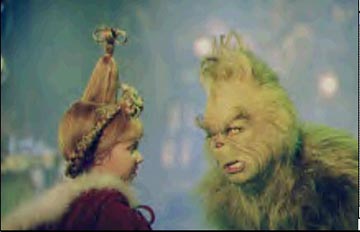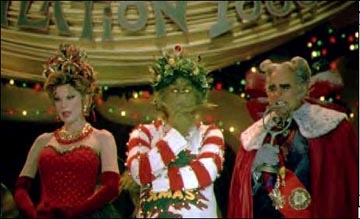

There is an ineffable wrongness about Ron Howard's live-action feature version of Dr. Seuss' How the Grinch™ Stole Christmas. There is a certain vulgarity and crassness about the film which defies a simple explanation, but which will probably leave most fans of the celebrated cartoon version squirming uncomfortably in their seats and wondering if they should have left the kids at home. . . .
Mind you, this version of How the Grinch™ Stole Christmas is not bad, per se -- on the contrary, count on it picking up a minimum of three Oscar® nominations -- and it provides an interesting back-story of how the Grinch (played by Jim Carrey) was transformed from an odd-ball young Who (played by Josh Ryan Evans of "Passions") into a synonym of villainy. Much of the trouble with the film, however, is rooted in this back-story, which shows us the Whos of Whoville not as the sweet, loving, adorable folk whom we have watched every year on TeeVee for most of our lives, but as cruel children whose adult Who-ness is sullied and tainted by what by what we learn of their school-age childWho savagery. Parts of the story have more in common with William Golding's Lord of the Flies than they have to do with anything that this writer associates with Dr. Suess!
There is an egregious amount of "potty humor" in Howard's presentation of the Grinch which would be simply unacceptable on American television. ("South Park" excepted, of course!) For example, at one point -- during a marvelously sweet and funny holiday Whobilitation -- the Grinch holds a piece of mistletoe over his bum and tells the Whos to kiss it; in another scene, the Grinch wipes Max the dog's butt across the face of the Mayor of Whoville (Jeffrey Tambor) and we are then treated to the sight of Max rubbing his own bottom to get it clean; as anyone who has ever had dogs and small children knows, this is not a pleasant matter for adults to explain to children, since dogs do this for several reasons; in either case, it is vulgar, distasteful, and discomforting. At times I was beginning to wonder whether or not Drew or Stu Lou Who (Cindy Lou Who's brothers) would wind up with an alien anal probe, a la Eric Cartman.

Also, do we need to see the Grinch biting off and eating the necks of glass bottles in order to show how "bad" he is? One wonders who will pick up the legal tab when some idiot follows suit and sues because the film was "a bad Hollywood influence" on him! Much of what the Grinch does is less calculated to create an air of villainy about him (the sort we associate with Boris Karloff's ominous narration in the cartoon version of the story) and more towards portraying him as icky and nasty and vulgar.
The opening and closing sequences of the film we have seen before -- done better -- in the ice fields of Titan A.E.; I was wondering where Matt Damon's spaceship was as this movie began!

Grouse, grouse, grouse! So what is right about the film? Well, Christine Baranski as Martha May Whovier, constant rival of Betty Lou Who (Molly Shannon) in the annual lighting competition (shades of "Whom Improvement"!), is deliciously funny as the near-perfect Who who is both love interest and (apparently) Whoville's rival to our own world's Martha Who-art. Taylor Momsen, as Cindy Lou Who, is excellent when she has the chance to act opposite a strong character (the Grinch, for instance), but is swallowed up in Who-blandness when she has to deal with her own family and neighbors. Max the dog (played by Kelley, who has third billing) was trained by Roger Schumacher (who trained Lilly, the dog who nearly stole As Good As It Gets from Jack Nicholson) and is definitely fun, but the expansion of Cindy Lou Who's role and the addition of other Whos not in the original story, such as Mayor May Who, greatly diminishes the heroic role Max plays in the story; one gets the feeling that most of Max's best work was left on the proverbial cutting-room floor.
Anthony Hopkins steps up to the plate as the Narrator, and he does a decent job, but fans of the original just know that he isn't Boris Karloff. Younger viewers less familiar with Karloff and more familiar with Hannibal Lecter should get a thrill from the narration, though.
Then there is Jim Carrey as the Grinch. Having been supremely confident that Carrey would become a major star after seeing him in one of his earliest roles (the less-than-great Once Bitten), this reviewer must confess to having been sorely disappointed in Carrey's choice of roles throughout most of his enormously successful career. Carrey does make the Grinch come alive on screen, but this is still not the great performance which I have been waiting for Carrey to deliver for these last fifteen years. Few actors could have pulled off the role of the Grinch; Carrey is one of them and he succeeds, but I still expect better from him.
The fatal coup de grace for Howard's version of the film is the Grinch's realization that, "Maybe Christmas doesn't come from a store." I certainly do not presume to speak for any other reviewers, but I gagged on the line the moment I heard it and immediately thought: "Maybe Christmas doesn't come from a store . . . but ancillary products do!" Be certain to go to McDonald's for your Grinch™ tie-ins. Be certain to buy all of your Grinch™ toys for whining little brats who know that the real meaning of an American Christmas is unbridled greed at Toys 'R' Us. Buy your Grinch™ Ziplock™, Saran™, and other S. C. Johnson products at your local market, and -- above all! be certain to help those hungry children who have been haunting you ever since you wouldn't eat your broccoli (or spinach or beets or whatever) by buying over-priced movie tie-in clothes manufactured in Third World countries by child wage slaves who earn fifty cents a day and will starve if you don't buy your kids the over-priced tie-ins which they make and none of whose profits ever trickles down to them. Remember, only your constant spending will keep those child wage slaves in broccoli, spinach, beets, zucchini and other foods you have always thought should be sent to them this holiday season.
Dr. Seuss' message may have been that Christmas is about love and joy, but the message of the film-making arms of multi-national corporate megalopolies is clear: "You really don't love someone unless you spend a lot of money buying presents for them." From Star Wars to How the Grinch Stole Christmas, that is the unspeakable and unholy message of most Hollywood films aimed at consumers and their parents.


